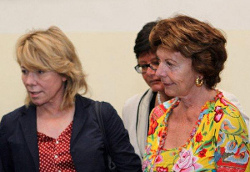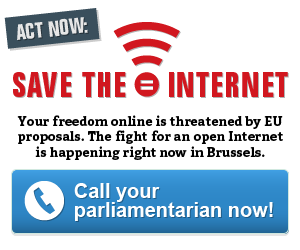Update: The vote scheduled for February 24th was postponed and is now scheduled for March 18th.
Paris, 18 February 2014 — On 24 February, the “Industry” (ITRE) committee of the European Parliament will take a crucial decision for the future of Net Neutrality in Europe, by adopting its report, on the basis of which the whole Parliament will vote. As things currently stand, Members of the European Parliament in ITRE still have the possibility to ensure a genuine and unconditional Net Neutrality principle, as proposed by others committees, so as to protect freedom of expression and online innovation. But instead, all might be lost because the liberal (ALDE) and socio-democrat (S&D) political groups seem ready to adopt the disastrous proposals made by Pilar Del Castillo Vera, the lead rapporteur in charge of this dossier. Unless citizens act and key MEPs show political leadership, we may be about to lose the Internet as we know it.
Update: During the shadow meeting, held on the afternoon of February 18, Catherine Trautmann has opposed to anti-Net Neutrality provisions proposed by the rapporteur Pilar del Castillo Vera

Pilar Del Castillo Vera and Neelie Kroes
On 24 February, the “Industry” (ITRE) committee will vote on its final report on Kroes’ anti-Net Neutrality proposal.
As demonstrated by the “Civil Liberties” (LIBE) committee’s vote last week, MEPs have the opportunity to implement effective safeguards to protect Net Neutrality by correcting the huge loopholes of the text.
But in the ITRE committee, the negotiations behind closed doors between political groups on so-called “compromise amendments” have taken an extremeley worrying turn, as the principle of Net Neutrality is being turned upside down to please the telcos. Current versions of compromise amendments (commented by La Quadrature du Net) would allow telecom operators to:
- degrade certain types of traffic (e.g. peer-to-peer) while letting other types of traffic enjoy a normal delivery1Rapporteur Del Castillo shamelessly proposes in recital 45 that Net Neutrality be defined as the principle according to which only equivalent traffic be treated equally, allowing for different quality of service for e.g. video traffic and VOIP traffic. In many other policy arenas, it is well understood and consensusal that Net Neutrality implies that all types of traffic are treated equally, as specified in the LIBE’s opinion report;
- make deals with Internet services (e.g. YouTube or Netflix) to grant them priorised delivery through so-called specialised services2By refusing to ban the delivery of specialised services for Internet services (or services “functionally identical” to such services) (a ban recommended by the LIBE report), articles 2.15 and 23.2 as proposed in ITRE open the door to the priorisation of Internet services in a way which would completely bypass the Net Neutrality principle and undermine fair competition in the digital economy.
Priorisation of Internet services or functionally identical services demands much more in-depth analysis before it should even be considered to be authorised by law, as it entails serious threats to innovation and fair competition in the digital economy. After the adoption of the regulation that must ban such priorisation, a debate should be held to define strong and detailed legal and technical non-discrimination safeguards to ensure that any content or service provider can benefit from such priorisation, free of discrimination, at reasonable rates and subject to reasonable terms and conditions. Such safeguard should be much clearer that the vague non-discrimination principle at the end of article 23.2. For instance, safeguards should include prior authorisation by National Regulatory Authorities (NRA) of classes of specialised services, with strong presumption against specialised services raising anti-competitive risk to Internet services; prior registration, transparence and careful assessment of any specialised services activated by providers of electronic communication; technical framework regarding interconnection and admission control, etc.).
Such a public debate should include SMEs, civil society organisations, and NRAs, who were not consulted on this specific issue.
Note that existing specialised services, e.g. for VoIP and TVoIP, are not “functionally identical” to best-effort Internet VoIP (e.g. Skype) or streamed TV programmes, and would not be hampered by LQDN’s proposed version of articles 2.15 and 23.2..
Currently, only the centrist/liberal (ALDE) and socio-democrat (S&D) groups, led respectively by Jens Rohde (DK – ALDE) and Catherine Trautmann (FR – S&D), are in the position to oppose the rapporteur and positively influence the outcome of next week’s ITRE vote. It seems however that Mrs. Trautmann does not firmly endorse the positions adopted in the LIBE committee, and could be ready to accept the rapporteur’s compromise amendments even though they fail to protect Net Neutrality. Only in this way can they ensure that ITRE will propose to the EU Parliament to adopt a meaningful protection of Net Neutrality.
In the coming days, it is urgent and imperative for European citizens to get involved and urge these MEPs to protect the public interest by following the opinion of the “Civil Liberties” committee rather than the dangerous position of rapporteur Pilar Del Castillo. The vote on the final ITRE report will take place on Monday, 24 February at the EU Parliament in Strasburg, France.
“In these ongoing secret negotiations, lead MEPs in charge of this dossier are about to give up on Net Neutrality, letting big corporations discriminate our Internet communications and dominate the digital economy. In the coming days, European representatives who really care for the Internet commons will have to show leadership, by pushing for a real definition of Net Neutrality and making sure that it is not bypassed through so-called ”specialised services””, says Félix Tréguer, cofounder of the association La Quadrature du Net.
“On 24 February, we have a unique opportunity to move toward the establishment of a genuine and unconditional Net Neutrality in Europe, but citizen participation is urgently needed. The ACTA vote showed that MEPs could be influenced by a broad citizen mobilisation. It is still the case today, especially with the upcoming European elections”, concludes Yoann Spicher, campaign coordinator at La Quadrature du Net.
Every European citizen can act to influence the evolution of Net Neutrality by calling on their MEPs to establish solid protections of the free Internet. To get on board, please visit the campaign website savetheinternet.eu.
References


